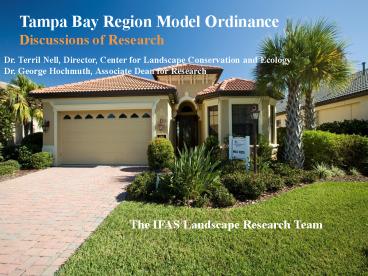Center for Landscape Conservation and Ecology: - PowerPoint PPT Presentation
1 / 26
Title: Center for Landscape Conservation and Ecology:
1
Tampa Bay Region Model Ordinance Discussions of
Research
Dr. Terril Nell, Director, Center for Landscape
Conservation and Ecology Dr. George Hochmuth,
Associate Dean for Research
The IFAS Landscape Research Team
2
(No Transcript)
3
The Model OrdinancesCommon Goal
- Several groups working on solving the problem
- Counties and municipalities
- Statewide FDEP model ordinance
- Statewide FDACS fertilizer rule
- Legislature consumer fertilizer task force
4
We all agree We need culture change
5
Tampa Bay Region Draft Model Ordinance from Tampa
Bay Estuary Program
- Using science to protect the environment
- No P fertilizer applied without valid soil test
- No N fertilizer within 30 days of laying sod
- Fertilize at lowest rates recommended
6
Fertilizer-free buffer zones
7
Negligible fertilizer movement from properly
applied fertilizer
8
200 linear feet X 5 feet wide mower 1,000
ft2 2,000 grams clippings (dry weight) 3.5
nitrogen in the clippings 70 grams nitrogen
0.15 lbs nitrogen
9
Do not apply fertilizer to impervious surfaces
10
Sloppy application of fertilizer
- Even with controlled-release fertilizers
- Even at commercial and public settings
- Controlled-release fertilizer in crevices is a
waste and contributes to storm water runoff
11
Transition image
12
Tampa Bay Region Draft Model Ordinance from Tampa
Bay Estuary Program
- An area of concern, possibly unintended
consequences - The Restricted Season from June 1st to September
30th - Some scientific considerations
13
Biology and ecology of turfgrass in the
lawn-research results
- Turf growth during the year
- Root growth during the year
- Nutrient uptake during the year
14
Warm-season turfgrass growth in the year
14
15
What happens to nutrients in a well-managed
landscape?
16
Lysimeters buried in center of each plot
17
Total N Leaching inEstablished Floratam St.
Augustinegrass 2006
Total Nitrate, mg M-2
18
UNINTENDED CONSEQUENCESHuman nature
- Overfertilization on the side
- Use of stashed quick release to correct perceived
problem
19
Loss of turf vigor and stand could lead to
increased leaching
20
Lower root mass in spring and fall may lead to
more leaching
Percentage of N Applied Leached ()
Days UAN 1/30
21
Percentage of N Applied Leached ()
22
Irrigation management is important for
preventing leaching and runoff
23
Our suggestions are for a flexible restricted
period
- Allow some flexibility during the restricted
period to correct a diagnosed nutrition problem - Tissue testing
- Soil testing
- Small fertilizer application only under specified
conditions - Teachable moments-change culture
24
(No Transcript)
25
Where do we go from here?
- We need watershed and springs friendly
fertilizers - Focus on proper fertilization practices
- Focus on irrigation management
- Educate the consumer, commercial applicators, and
retail establishments
26
Tampa Bay Region Model Ordinance Discussions of
Research
Contact Us Dr. Terril Nell .tanell_at_ufl.edu Dr.
George Hochmuth.hoch_at_ufl.edu































